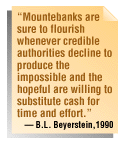
Why Influence?
Everyday
Modern
Definitions
# of Tactics?
16 Tactics
53 Tactics
Ethics I
Ethics II
Disciplines
Approach
Bad Info
Structure
Mindfulness
Mindlessness
Matrix
Bibliography
Classwork
Links

 "Laaa-dies
& Gentlemen! Children of all ages! Gather around and you
shall learn of my fabulous concoction of maaa-gic persuasion!
Command and watch people follow! Throw them into your thrall!
Become a maaa-ster salesman! Just buy my concoction, just two
bucks a glass . . . just step right on up, sir , don't let opportunity
pass. . . you look like you could stand to be more persuasive,
ma'am, just step right up, this bromide will fix what ails you
. . . "
"Laaa-dies
& Gentlemen! Children of all ages! Gather around and you
shall learn of my fabulous concoction of maaa-gic persuasion!
Command and watch people follow! Throw them into your thrall!
Become a maaa-ster salesman! Just buy my concoction, just two
bucks a glass . . . just step right on up, sir , don't let opportunity
pass. . . you look like you could stand to be more persuasive,
ma'am, just step right up, this bromide will fix what ails you
. . . "
Bad information. It's everywhere! It used to travel laboriously from person to person. In our age, the media broadcasts it, the newspapers print it, the radio spews it, the web spawns it, gurus make seminars out of it, and neighbors and coworkers help pass it along.
Like a disease, pseudoscience runs through broad gutters of sophisticated misinformation, contaminating the groundwater of common knowledge and leeching into the minds of the media-fed masses. Undetected and uncorrected, furtively avoiding verifiable fact, bad information propagates disastrous errors and mistakes.
And, when it comes to the study of persuasion, there's plenty of bad information to go around:
- "The faster you speak, the more persuasive you are."
- "Use dissonance to change people by pointing out their inconsistencies."
- "A vivid message is more persuasive than a pallid one."
- "A positive message is more persuasive than a negative one."
- "Always use the word 'because,' and never say the word 'please.' "
- "Control the sales situation and conquer the customer."
- "The color red provokes people into buying."
- "Take command of the sales situation and tell the customer what to do."
- "Subliminal messages are powerful manipulators."
- "Mimic the body language of your target and you'll make the sale."
The preceding atheoretical assortment of half-truths and falsehoods will sooner or later be uncovered by anyone earnestly seeking information about influence. Why is there so much misinformation about compliance and persuasion? Here's my view:
The knowledge of influence is vital to survival in societies that are based on persuasion, not coercion. (Like ours! And the rest of the free world.) The importance of this knowledge was apparent to our ancestors, and the ancient study of persuasion--rhetoric--was part of the curriculum of the educated citizen of the past. Take, for instance, the medieval curriculum of the trivium, which consisted of grammar, logic, and rhetoric. One third of the curriculum concentrated on nothing but how to influence others! Another third focused on how to create a correctly-worded message, and the final third concentrated on how to create reasoned arguments.
But the scientific renaissance at the beginning of this century
deemphasized the persuasive arts. Since there was no true science
of persuasion (until the rise of social influence in the 1950s),
persuasion wasn't taught as part of modern curricula. It still
isn't, unless you happen to take an advanced social psychology
course in college. And even then, social psychology is a relatively
"young" science, and not exactly a dominant social
institution.
So, you free-marketers out there, tell me what happens when a large demand exists but no sanctioned product to fill it? Exactly right-- a black market develops. And our society has a teeming, thriving black market of influence.
Since the persuasive arts and sciences of today are relegated to the academic stratosphere, society has found something to fill the gap--because something is better than nothing. Right?
Consequently, our society is swarming with persuasion peddlers and influence gurus-- some are knowledgeable, thoughtful, and effective; many are brash and ignorant people who mix a little truth with a lot of hype and a feel-good philosophy to create their own "magic elixirs of persuasion." Hey, it sells.
There are a number of sources of information to avoid, or at least examine carefully before "buying." The breeding grounds of bad information as relates to persuasion are often found in conjunction with:
- Schools of thought that are supported by anecdotes, stories,
and testimonials but are not supported by verifiable evidence
- Self-esteem seminars
- Self-styled persuasion experts with no verifiable expertise
- Hypnotists who operate outside their areas of expertise
- The bankrupt concept of "subliminal persuasion"
- And others who advance "magical" influence and control techniques, even if their books sell in the millions.
One question I've been asked a number of times is, "What about NLP?" Read on . . .
All rights reserved.
www.workingpsychology.com
